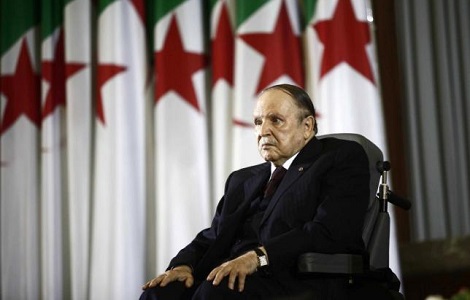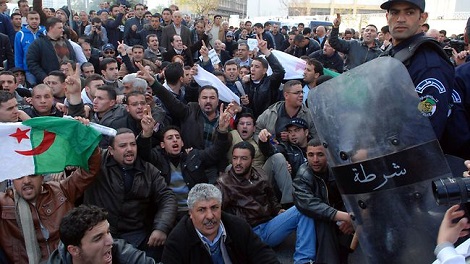The Algerian regime, a self-declared public democracy – although with major problems – went through the Arab spring in 2010-2011 with only small blemishes. President Abdelaziz Bouteflika, who got in office after the end of the Civil War in 1999, managed to restrain the Algerian people’s rage  stemming from unemployment, corruption and high food prices. This was achieved partly with the help of a powerful police force, but also with economic inducements and constitutional reforms that are still ongoing.[1] At the moment, Algeria faces great issues domestically, while it tries to create bonds with western powers such as the United States or the European Union.
stemming from unemployment, corruption and high food prices. This was achieved partly with the help of a powerful police force, but also with economic inducements and constitutional reforms that are still ongoing.[1] At the moment, Algeria faces great issues domestically, while it tries to create bonds with western powers such as the United States or the European Union.
Algeria’s economic policies, despite being the most functional ones in North Africa, are slowly transforming the once socialist economy into a western, liberal one, with the 1989 Constitution as a starting point. Furthermore, the African country is an important supplier of natural gas and oil to Europe and to the U.S, respectively. Nevertheless, the dependence on the oil sector has caused stability problems, especially as the oil prices have been falling dramatically. The percentage of hydrocarbon exports represents 97% of total exports, and up to 58% of its total revenue.[2] Subsequently, as the prices are plummeting, Algeria’s budget has to deal with a deficit of 14% and with imports costing the country around $60bn, effectively absorbing domestic funds. Bouteflika’s government is aware of the dangers that originate from an oil crisis, as the events of 1990 were caused partly from one.[3] His state-oriented policies though have failed to break the oil dependency as of yet, and the private sector is considerably underdeveloped. The government’s measures so far include pausing civil servant hiring and holding off on public projects or delaying on social benefits. Algerians are suffering from high poverty and unemployment rates, especially among university graduates (11,2 % according to a survey by the National Office for Statistics).[4]
Furthermore, Algeria is always struggling with its neighbors, with whom the relations were steadily bad, especially with Mauritania and Morocco over the Western Sahara conflict. Morocco has a constant presence in the area, a presence considered as an illegal occupation by Algeria, which supports the Polisario government-in-exile. At this moment, Algeria is working with the UN on the self-determination for the people of Western Sahara, but doesn’t stake a claim on the territory. Meanwhile, the country has to deal with 150.000 Zahrawi refugees from Western Sahara, living in camps in western Algeria.[5] Needless to say, the Western Sahara issue has been a lengthy one and Bouteflika’s regime doesn’t seem eager to end the dispute with the neighbor countries. Although it could be that Algeria focuses on the conflict for idealistic reasons, reasons that include the destabilization of Morocco suggest otherwise. Others support that Algeria, taking a page from Morocco, uses the conflict for domestic reasons such as f keeping public attention away from social and economic problems.[6]
Additionally, 75.000 troops have been sent to the borders with Libya and Mali to prevent any invasion from Islamic insurgents or belligerent parts from the two countries.[7] Algeria acts as a strong U.S. regional partner against terrorism in northern Africa. Nonetheless, its level of insurgency is low compared to other Maghreb countries, despite the presence of Al-Qaeda in the Islamic Maghreb (AQIM), an Al-Qaeda branch that actually rose from the country’s civil war.[8] AQIM is a strong and active terrorist group in the area gaining an important number of recruits and owning an arsenal that eventually grew stronger after the fall of Libyan state. Yet, despite the fact that Algeria is the target at the top of the list for the group, the country’s strong counter-terrorism program and military has limited AQIM’s acts mostly to kidnappings. Still, fear is omnipresent as attacks are increasing since 2007, with the latest one being held by AQIM on March 18th for the “scandalous involvement with France in the war against the Muslims in northern Mali.”[9] In 2014, a group left AQIM and pled alliance to IS and Abu Bakr Al-Baghdadi, although they only proceeded with one terrorist attack so far.[10]
On one hand, all these “open wounds” in Algeria indicate enough reasons for a country to be introvert. On the other hand, there is one major reason for the Algerian people to demand peace and serenity. As a matter of fact, the “Arab spring” era demonstrations weren’t as powerful, long-term and popular because it seems that Algeria has already undergone its “spring” back in 1989. The demonstrations of 1989 demanding constitutional reform and democracy, ended up bringing the Islamic party to power –the country experienced the Islamic Salafist movement soon enough-, and the military coup d’état that ensued submerged the country into chaos and a civil war that accounted for 200.000 victims.[11] Given that the collective memories of mass violence are still fresh, the country still struggles with transiting to completely free elections and media and with forgetting the civil war victims. Last but not least, the examples of the neighboring countries that have had their own Arab Spring, such as the stateless Libya have given birth to the fear of the creation of a similar situation in the country and some eagerness from the Algerian people to maintaining the status quo.[12]
coup d’état that ensued submerged the country into chaos and a civil war that accounted for 200.000 victims.[11] Given that the collective memories of mass violence are still fresh, the country still struggles with transiting to completely free elections and media and with forgetting the civil war victims. Last but not least, the examples of the neighboring countries that have had their own Arab Spring, such as the stateless Libya have given birth to the fear of the creation of a similar situation in the country and some eagerness from the Algerian people to maintaining the status quo.[12]
At the same time the President has openly exploited the fear of the Algerian citizens and pushed the country into invisibility, virtually keeping a low profile for a country that once led the Non-Aligned Movement during the Cold War era.[13] The country, still under the shadow of a 9-year long civil war, is trying to stay unnoticed by the western media and human rights observatories turning to introversion and losing its pivotal role in the Arab world. Bouteflika, rumored to be very ill after a series of strokes, recently addressed the Algerian people and called for unity against terrorism and courage against the economic crisis, reminding once again the stakes of an uprising:
“Our people is also urged to remain vigilant and united to counter the devastating plots against the whole Arab nation, which peoples pay the price today as we ourselves have done during the national tragedy, which certainly came from outside".[14]
Finally, Bouteflika himself is at very dubious state of health. He has not appeared in public in over two years. Fears are growing that he has been incapable of governing for a long time and that a soft coup has essentially taken place by the entourage of his brother Said.[15]
To conclude, it is evident that Algeria is a country facing major domestic problems and has a long way to go in order to be called a free speech, pluralist democracy. It is also true that it is part of an afire region. But most of all, Algeria seems discouraged and tired, and has many concerns about its future. The President is virtually absent; the other members of the generation of Independence –a key factor in Algeria politics- are dead or retired. Nonetheless, the country is one historical stage ahead of Syria or Libya. It is still healing from fresh wounds and obviates dangerous uprisings, despite the dissatisfaction from the Bouteflika regime’s corruption, lack of freedom rights protection and mismanagement. Of course, le pouvoir is making the best of it, presenting itself as the lesser of two evils.
All links accessed on 6/4/2016
[1] Zoubir, Yahia H., “Algeria after the Arab spring”, Foreign Affairs, (9/2/2016) https://www.foreignaffairs.com/articles/algeria/2016-02-09/algeria-after-arab-spring
[2] Khettab, Djamila Ould, “Oil price slump threatens to erode Algeria's status quo”. Al-Jazeera, (3/2/2015), http://www.aljazeera.com/news/2015/02/oil-price-slump-threatens-erode-algeria-status-quo-150203102439772.html
[3] The Guardian, “The Guardian view on the geopolitics of falling oil prices”, (13/1/2016), http://www.theguardian.com/commentisfree/2016/jan/13/the-guardian-view-on-the-geopolitics-of-falling-oil-prices
[4] Benalia, A. A., “Emploi et chômage en Algérie: Les chiffres révèlent un malaise social”, L’Actuel, http://www.actuel-dz.com/articles/art04.html
[5] Sefte, Whitney, “Western Sahara’s stranded refugees consider renewal of Morocco conflict”, The Guardian, (6/1/2015), http://www.theguardian.com/world/2015/jan/06/morocco-western-sahara-referendum-delay
[6] Al-Sabiri, Adam, “Algeria and Morocco: Using the Western Sahara conflict to distract from domestic troubles?”, Alakhbar, (12/11/2014), http://english.al-akhbar.com/node/22450
[7] Zoubir, Yahia H., op.cit
[8] Arieff, Alexis, “Algeria: Current Issues”, Congressional Research Service, Report Prepared for Members and Committees of Congress, (13/11/2013)
[9] Weiss Caleb, “AQIM claims attack on Algerian gas plant”, Long War Journal, (19/3/2016), http://www.longwarjournal.org/archives/2016/03/aqim-claims-attack-on-algerian-gas-plant.php
[10] Al Jazeera, “ISIL-linked group beheads French captive”, (25/9/2014), http://www.aljazeera.com/news/middleeast/2014/09/algeria-fighters-behead-abducted-frenchman-2014924153845171677.html
[11] The Economist, “The lesson of Algeria”, (19/4/2015), http://www.economist.com/news/leaders/21600984-even-if-arab-spring-has-sorely-disappointed-dictators-even-benevolent-ones-are-not
[12]Khan, Mohsin, Mezran, Karim, “No Arab Spring for Algeria”, Atlantic Council, Rafik Hariri Center for the Middle East, Washington D.C., 2014, p. 1, http://www.atlanticcouncil.org/images/publications/No_Arab_Spring_for_Algeria.pdf
[13] Daoud, Kamel, “The Algerian Exception”, The New York Times, (29/5/2015), http://www.nytimes.com/2015/05/30/opinion/the-algerian-exception.html?rref=collection%2Ftimestopic%2FAlgeria
[14] Algerie Presse Service (Algiers), “Algeria: President Bouteflika - Algerian People Has to Be Vigilant for Safeguarding Country”, All Africa, (19/3/2016), http://allafrica.com/stories/201603210621.html
[15] Gall, Carlotta, “Who Runs Algeria? Many Doubt It’s Ailing President Abdelaziz Bouteflika”, New York Times, (23/12/2015), http://www.nytimes.com/2015/12/24/world/africa/suspicions-mount-that-ailing-president-abdelaziz-bouteflika-is-no-longer-running-algeria.html?rref=collection%2Ftimestopic%2FAlgeria
